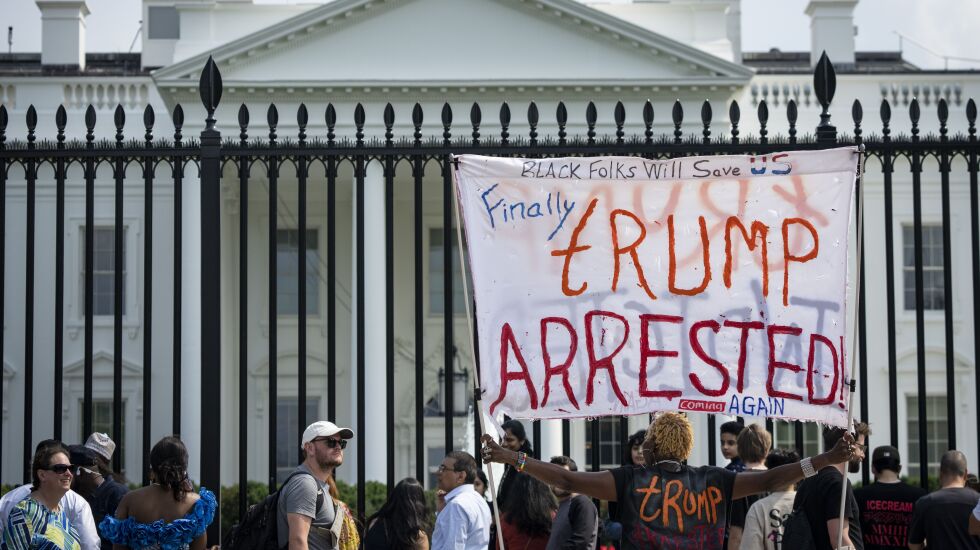
Reacting to the federal indictment of former President Donald Trump, many of his supporters argue the criminal charges prove the U.S. Justice Department is being “weaponized” for political purposes and that this is illegitimate.
Almost none claim he is innocent; they claim only that he should not be prosecuted. Some add the United States now has a two-tiered criminal justice system, one for Trump and the other for President Joe Biden and his family and allies.
There well may be two tiers to our criminal enforcement. But if so, Trump, Biden, and almost everyone they know are together in the top tier.
These Trump supporters unintentionally reveal a different assumption about our criminal enforcement apparatus: That it will be used exclusively against unwanted outsiders, not against insiders; that it will be reserved for the poor, the weak and the unwanted, rather than used to punish the rich, the strong and the valued.
By the numbers, they make an understandable if misstated assumption. So rarely do those with social status — money, power, fame — get ensnared in criminal cases that we hear about every case.
Setting aside traffic offenses, some 8 million people in this country face criminal charges every year. Almost all pass unseen and unheard. Even so-called “white collar” cases often name relative outsiders, as those crimes usually are garden-variety fraud or theft.
But the very rare defendant who is not poor and marginalized becomes an object of intense media and public interest. We know about every O.J. Simpson, Enron executive, Martha Stewart, Harvey Weinstein, Ghislaine Maxwell, Alex Murdaugh or Elizabeth Holmes, so few are they.
Consider Simpson. His trial ran more than eight months in 1995, dominating the news. During that same eight months, how many other murder cases began and ended in the same county, Los Angeles? Several, probably. In 1994, that one county had 1,669 murders; in 1995, 1,682. Yet nobody other than the victims’ families and direct participants ever heard about most of those murder cases.
Politicians campaign on ‘lock ‘em up’
As a matter of values, Trump’s supporters betray something common and cynical in their view of prosecution. Using criminal law as a weapon or a political tool is objectionable — even outrageous — only when directed against someone who, implicitly, should be out of reach of the criminal apparatus: someone too rich, too popular, too powerful or (often) too white to be charged.
As to everyone else, use of criminal enforcement as a weapon or for political reasons is routine and unobjectionable, even welcomed. Richard Nixon ran for president in 1968 heavily on an explicit promise to restore “law and order,” meaning increase the frequency and severity of punishment. Nixon stoked fear of crime and promised effective retribution as a cure. He won.
Since then, politicians have campaigned on promises to lock up more people and for longer. Often they have succeeded, too. When rare prosecutors take a less punitive approach, they are attacked or even recalled for that very reason: Just ask Chesa Boudin (San Francisco), Larry Krasner (Philadelphia), Kim Gardner (St. Louis) or George Gascon (Los Angeles).
The effects of this weaponization and political use of criminal enforcement systems are real. From just 1980 to 1986, as Nixon’s war on crime became Reagan’s more specific war on drugs (for his own political gain), average federal drug sentences increased 33% in length. They have climbed higher since then under both Republican and Democratic administrations.
Legislative mandatory minimum sentences, a favorite political tool, were rare in 1968; they are common, and often lengthy, today. More broadly, in 1968 the United States had under 188,000 prisoners, with a per capita rate of incarceration of 94 per 100,000. In 2021, even after 10 years of decline from its peak, the country had 1,204,300 prisoners, with a per capita rate of incarceration of 449 per 100,000 — more than four times higher than a half- century earlier.
In his remarks after the Florida indictment of Trump was unsealed, special prosecutor Jack Smith said, “We have one set of laws in this country, and they apply to everyone.” At a theoretical level, yes.
But Trump’s supporters give away the messier reality. Many of us don’t mind political purposes of prosecution or weaponization of the process at all, so long as we and those with whom we identify face no risk. Practically, there are two sets of laws in this country.
The divide is not as Trump supporters and others pretend, though. No, in practice one set punishes the poor and weak heavily and routinely, partly for gain of politicians, and another permits the wealthy and powerful to behave with comparative impunity.
In a real sense, Trump had to try hard to get charged with crimes.
Dean Strang is a law professor at Loyola University Chicago and a criminal defense lawyer.
Send letters to letters@suntimes.com
The views and opinions expressed by contributors are their own and do not necessarily reflect those of the Chicago Sun-Times or any of its affiliates.







